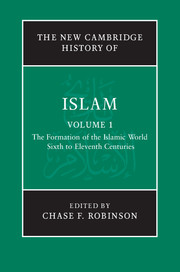Book contents
- Frontmatter
- Introduction
- PART I THE LATE ANTIQUE CONTEXT
- PART II UNIVERSALISM AND IMPERIALISM
- PART III REGIONALISM
- PART IV THE HISTORIOGRAPHY OF EARLY ISLAMIC HISTORY
- 15 Modern approaches to early Islamic history
- 16 Numismatics
- 17 Archaeology and material culture
- Conclusion: From formative Islam to classical Islam
- Glossary
- Bibliography
- Index
- Plate Section
- References
15 - Modern approaches to early Islamic history
from PART IV - THE HISTORIOGRAPHY OF EARLY ISLAMIC HISTORY
Published online by Cambridge University Press: 28 March 2011
- Frontmatter
- Introduction
- PART I THE LATE ANTIQUE CONTEXT
- PART II UNIVERSALISM AND IMPERIALISM
- PART III REGIONALISM
- PART IV THE HISTORIOGRAPHY OF EARLY ISLAMIC HISTORY
- 15 Modern approaches to early Islamic history
- 16 Numismatics
- 17 Archaeology and material culture
- Conclusion: From formative Islam to classical Islam
- Glossary
- Bibliography
- Index
- Plate Section
- References
Summary
Preliminary considerations
Western writing on Islam, including early Islamic history, has roots reaching back to the medieval period. These earliest Western writings were almost without exception religious polemics – tracts intended to assert the theological claims of Christianity and to disprove or discredit those of Islam. They often pursued these goals by presenting grotesque misrepresentations of Islam and its history. Polemicists devoted special attention to discrediting the Qurʿān and Muḥammad because this, they thought, would most effectively undermine Islam’s faith-claims – that Muḥammad was a prophet, and that the Qurʿān was God’s revealed word.
This polemical tradition cannot, of course, be considered scientific scholarship, the goal of which is to understand the subject of its study, not to discredit it; but it is important to remember that the Western tradition of anti-Islamic polemic formed the background against which more scholarly writings first developed, and thus in some ways inevitably helped shape the latter. Early Islamic history in particular, because it includes the story of the life of Muḥammad, the revelation of the Qurʿān and the early expansion of the Believers, was long closely entangled with polemic. Moreover, the polemical tradition never completely died out, but has survived right up to the present in a variety of guises.
Keywords
- Type
- Chapter
- Information
- The New Cambridge History of Islam , pp. 623 - 647Publisher: Cambridge University PressPrint publication year: 2010
References
- 8
- Cited by



